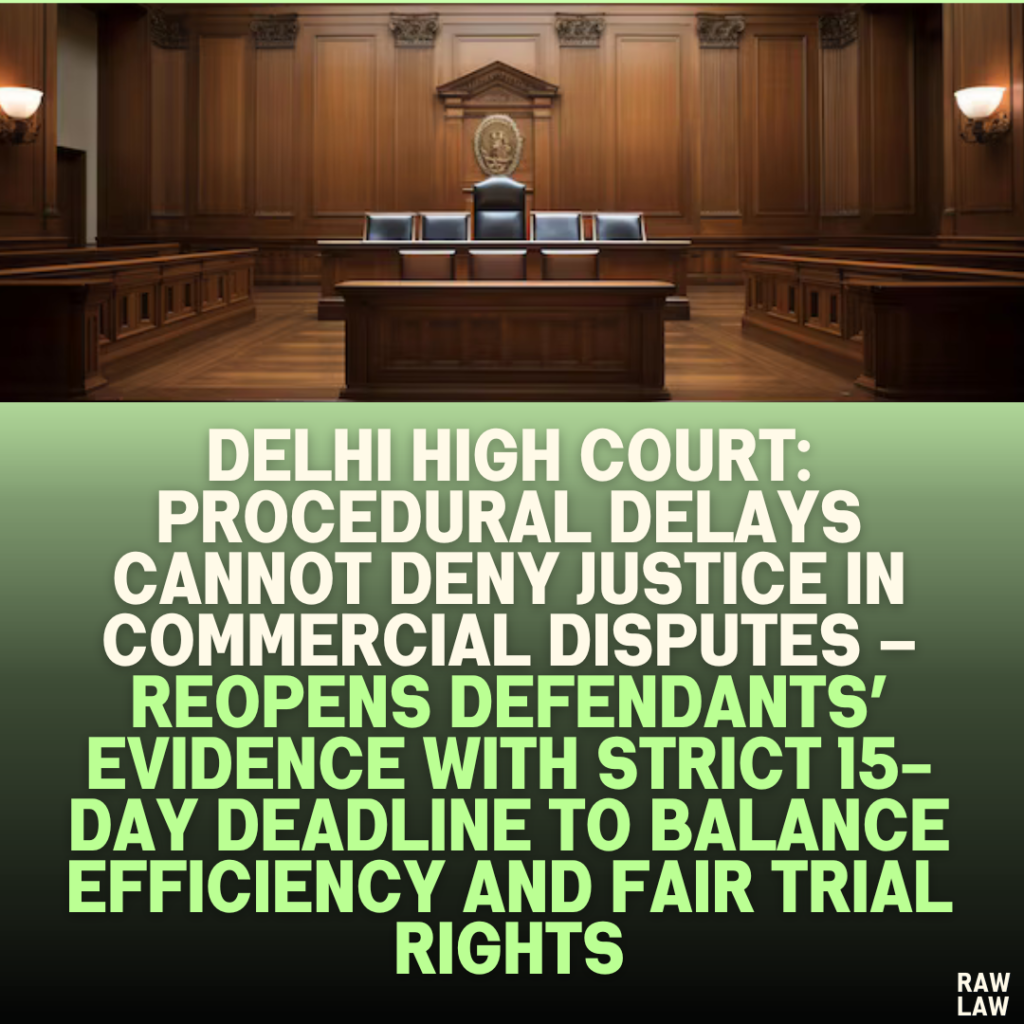Court’s Decision
The Delhi High Court overturned the trial court’s decision to close the defendants’ evidence in a high-value commercial case. The High Court directed the trial court to reschedule the hearings to allow the defendants to present their evidence, emphasizing that procedural requirements should not obstruct justice. However, it stipulated strict conditions, stating that the defendants must complete their evidence within 15 days without seeking further adjournments.
Facts
- Nature of the Dispute:
The case involved a commercial dispute where the plaintiff sought recovery of ₹1,99,95,133/- from four defendants, including the petitioners. - Case Management Schedule:
- On August 6, 2024, the trial court fixed a schedule under Order 15-A of the CPC, appointing a Court Commissioner to record evidence:
- Plaintiff’s Evidence: September 1–13, 2024.
- Defendants’ Evidence: September 16–27, 2024.
- On October 7, 2024, the schedule was modified, extending the timeframe to October 16–29, 2024.
- On August 6, 2024, the trial court fixed a schedule under Order 15-A of the CPC, appointing a Court Commissioner to record evidence:
- Missed Opportunities:
Despite the revised schedule, the defendants failed to produce their evidence. The Court Commissioner noted that:- Three opportunities were granted (October 22, 26, and 29, 2024).
- The defendants could not present their witnesses.
- Trial Court’s Action:
On November 14, 2024, the trial court dismissed the defendants’ application under Order 15-A Rule 6 of the CPC, reasoning that the defendants were intentionally delaying the proceedings.
Issues
- Did the trial court err in closing the evidence of the defendants?
- Were the defendants’ reasons for delay genuine and justifiable?
- Should procedural timelines under Order 15-A CPC override the substantive right to present evidence?
Petitioner’s Arguments
The petitioners argued that:
- Statutory Timeframe: The trial court prematurely closed their evidence despite the statutory period for completion of the trial being valid until February 6, 2025.
- Genuine Delays: The delays were due to unavoidable circumstances:
- A key witness was stranded in Lucknow.
- Evidence of this was shared in the Court Commissioner’s WhatsApp group, including air tickets.
- Inequity: The plaintiff was granted nine days to present its evidence, yet the defendants were not afforded similar flexibility.
- Right to Fair Trial: The trial court’s decision deprived the defendants of their fundamental right to contest the matter on merits.
Respondent’s Arguments
The respondents contended that:
- The defendants repeatedly sought adjournments under frivolous pretexts, delaying the trial.
- The trial court’s order was consistent with the Commercial Courts Act, which mandates expeditious resolution of disputes.
- The defendants’ conduct demonstrated a lack of seriousness in contesting the case.
Analysis of the Law
The High Court examined the provisions of Order 15-A of the CPC, introduced to facilitate swift disposal of commercial disputes:
- Rule 3: Requires that arguments in a commercial case conclude within six months from the first case management hearing.
- Rule 8: Grants courts discretion to condone delays on payment of costs, ensuring procedural non-compliance does not prejudice substantive justice.
The court emphasized that the Commercial Courts Act aims to balance efficiency with fairness, and procedural deadlines should not result in a miscarriage of justice.
Precedent Analysis
While no specific precedents were cited in the judgment, the principles underlying the Commercial Courts Act and the CPC were reiterated:
- Justice should not be sacrificed for procedural expediency.
- Courts should adopt a pragmatic approach, ensuring parties have a fair opportunity to present their case.
Court’s Reasoning
Justice Ravinder Dudeja articulated that:
- Balancing Speed and Justice:
“The trial court should have ensured that the lis between the parties is decided on merits rather than technicalities.”
While speed is essential in commercial litigation, fairness should not be compromised. - Pragmatic Approach:
The trial court failed to adopt a justice-oriented approach. The defendants’ inability to present evidence due to unavoidable circumstances warranted leniency. - Condonation of Delays:
The trial court had the discretion under Rule 8 of Order 15-A CPC to condone non-compliance and impose costs instead of foreclosing the defendants’ right to present evidence.
Conclusion
The High Court allowed the petition, setting aside the trial court’s order. It directed the trial court to:
- Fix fresh dates for the defendants to record their evidence within 15 days.
- Ensure the defendants strictly adhere to the schedule without seeking further adjournments.
The High Court emphasized that this decision aimed to uphold the principle of justice while maintaining the expeditious resolution of the case.
Implications
- Judicial Discretion: The ruling reinforces that courts must exercise discretion judiciously to balance procedural efficiency with fairness.
- Fair Trial Rights: It underscores that procedural lapses should not result in denial of a party’s right to a fair trial.
- Commercial Litigation: The judgment serves as a reminder that the Commercial Courts Act’s objectives should not override the fundamental principles of justice.
This case sets a precedent for adopting a pragmatic approach in commercial disputes, ensuring litigants are not unfairly prejudiced by procedural rigidity.
